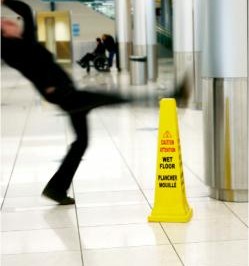
- Automobile Accidents
- Truck Accidents
- Medical Malpractice
- Maritime Accidents
- Product's Liability
- Premises Liability
- Dangerous Property Hazards
- Defective Sidewalks
- Electricity and Electrocution
- Elevator Accidents
- Slip and Fall Accidents
- Staircase Accidents
- Traffic Tickets
- Workers' Compensation
- Notary Public
- Immigration
- Business and Transactional Law
- General Consultations
- Criminal Law
- Traumatic Brain Injuries
Slip and Fall Accidents
Slip, trip and fall accidents are generally considered “premises liability” cases. These cases arise when a property owner or custodian is negligent in the maintenance, repair and upkeep of the property in question. Many states have laws that require landowners to maintain their property so that it does not present an unreasonable risk of harm to those that visit the property. Often, these laws pertain to both business owners and homeowners.
In Louisiana, a merchant owes a duty to persons who use his premises to exercise reasonable care to keep his aisles, passageways, and floors in a reasonably safe condition. This duty includes a reasonable effort to keep the premises free of any hazardous conditions which reasonably might give rise to damage.
Premise liability cases include: ” slip and falls at commercial establishments caused by liquids or foreign substances; ” trip and fall incidents caused by unsafe property conditions; “construction site accidents and, assaults by employees or business patronsIn many states, business owners and property owners have a duty to provide a safe environment for individuals on their premises.
If you are injured because a property owner or a business establishment fails to provide a safe environment, you may have a right to bring a claim for various damages incurred due to your injury. In many states, these damages include pain and suffering, medical expenses and lost wages.
If you are involved in a slip/trip & fall accident, you should (1) avoid making any detailed statements concerning fault; (2) get names of owners and managers of property; (3) write names of witnesses; (4) take good pictures of scene and injuries; (5) save footwear and clothing; (6) seek medical attention if injured; and (7) not give recorded statements to insurance adjusters.
The liability of a premises owner or operator depends on the state and federal laws that apply to the circumstances. For example, an owner of a home or public store has a duty to warn you about any known hazards that you might encounter. Construction workers are legally obligated to warn and protect the public from hazard at their work sites. Depending on individual circumstances, all may still be liable for injuries you receive while on their premises, even if they warned you of potential injury.





